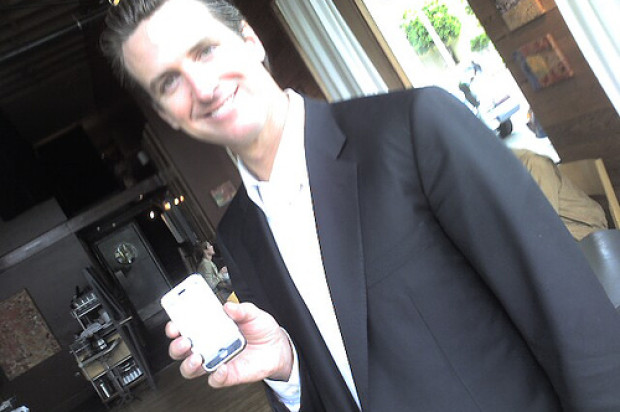
What a long, strange trip it’s been for San Francisco’s attempt to require disclosure of the possible dangers of cell phone use, the “Cell Phone Right to Know Act.: After years spent in court, a proposed settlement would dump the law for good — but might save SF taxpayers some dough.
Proposed in 2010 my then-mayor Gavin Newsom, the measure was supposed to require cellphone retailers to provide customers with information about the possible dangers associated with radiation from the devices as well as ways that users can reduce their exposure.
A cell phone industry group, CTIA, filed suit to prevent the law from moving forward, claiming the city ordinance violates retailers’ free speech rights by forcing them to display information they consider “grossly misleading.”
The group also contends the ordinance conflicts with federal law, ands is seeking repeal of the ordinance as well as attorneys’ fees from San Francisco taxpayers.
The bill was supposed to go into effect September 1, 2010, but has been pushed back repeatedly, and is now “on hold for the time being,” Mark Westlund, spokesman for the Department of the Environment, told the Appeal in April of 2011.
Though there was speculation in 2011 that with Newsom on to greener Lt. Gov pastures and the city facing a budget defect that San Francisco would fold on the issue, that wasn’t the case: City Attorney Dennis Herrera defended the law in federal court in October, 2011, saying that the city’s position on the law is that “this is about public information.”
“It’s about informing consumers of a possible risk and measures they can take to avoid it,” Herrera said.
“Freedom of speech should be about encouraging the exchange of ideas, not keeping people in the dark,” he said.
The CTIA argued in papers submitted to Alsup that the allegedly “alarmist” warnings will hurt the wireless industry.
“The public interest will be harmed by the city’s misleading warnings and its efforts to discourage cell phone use,” the group’s lawyers wrote.
Later that month, U.S. District Judge William Alsup struck down the requirements for warning posters on store walls and stickers on cellphones, saying that both intruded on the retailers’ own messages.
But he said the city could continue to require sellers to give customers a 5-inch-by-8-inch fact sheet prepared by the city, so long as the sheet was revised to avoid giving a misleading impression.
Alsup said federal courts have ruled that governments can require businesses to provide accurate facts relevant to public health.
“The First Amendment permits a government to require businesses to disclose accurate and uncontroversial facts as long as the disclosures are reasonably related to a governmental interest in preventing deception or in protecting public health and safety,” Alsup wrote.
Alsup said the fact sheets must make it clear that the Federal Communications Commission has set radiofrequency safety limits for cellphones and that any phones sold must comply with those limits.
But he said the facts sheets could add a phrase saying that “no safety study has ever ruled out the possibility of human harm from radiofrequency exposure.”
Herrera praised the part of the decision allowing the fact sheets to be used, but said he will appeal the rest of the ruling to the 9th U.S. Circuit Court of Appeals.
“We will ask the 9th Circuit to uphold the portion of the ruling that allows the fact sheet to go forward, but we will also ask the court to make clear that we have even broader authority to protect the health of our people,” Herrera said.
In August 2012, we were back in court, when CTIA attorney Andrew McBride argued the fact sheets violate phone makers’ free speech rights by forcing them to give an allegedly misleading and controversial message they don’t agree with.
Wireless phone makers “want to say, ‘Enjoy your new phone and use it,’” McBride told a three-judge panel of the 9th Circuit.
“But the city of San Francisco makes them say, ‘Hey, wait a minute, this device may cause cancer and use it sparingly,’” McBride said.
“That’s the opposite of what we want to say,” he told the panel.
Deputy City Attorney Vince Chhabria argued the measure is merely a “consumer disclosure requirement” justified by public health concerns.
“What about the consequences if the risk bears out? We’re talking about (alleged possible) malignant brain cancer here,” he told the court.
“San Francisco has to look at this from the perspective of government and the perspective of public health,” Chhabria said.
McBride called the fact sheet “almost laughable” and said it misleads consumers into fearing risks that haven’t been proved.
“There is no evidence cell phones actually cause harm,” he said.
In response, Chhabria noted that under California’s Proposition 65, a 1986 voter initiative, a World Health Organization rating of a chemical as a “possible carcinogen” is enough to trigger a mandatory cancer warning on products containing that chemical.
San Francisco and the CTIA were expected to go back into battle in February 2014, but the Ex reports that with a settlement in the works, the CTIA might get everything they asked for, except for their attorney fees.
According to the Ex, both sides have “hashed out” the settlement agreement, which would toss every aspect of Newsom’s ill-fated law and end the court appearances.
In return, the CITA would pay their own legal fees, which could be a boon since, as City Attorney’s Office spokesman Matt Dorsey told the Ex, “these kinds of constitutional challenges to local ordinances can run up fees in the mid- to high six figures.”
A Board of Supervisors committee is expected to consider the settlement, after which it must be approved by the full board.









